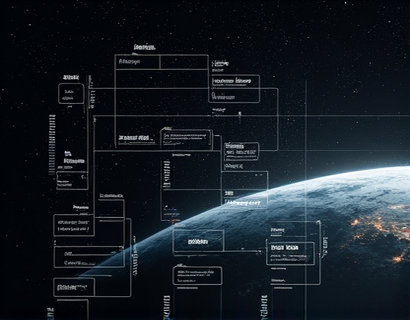Revolutionizing Transportation Logistics: Advanced Software Solutions for Enhanced Delivery Efficiency and Cost Savings
In the rapidly evolving landscape of transportation and logistics, businesses are constantly seeking ways to enhance efficiency, reduce costs, and improve customer satisfaction. Advanced software solutions have emerged as a pivotal force in transforming the industry, offering innovative tools that streamline operations and optimize supply chain processes. This article delves into the transformative impact of these software solutions, highlighting how they can elevate transportation logistics to new heights of performance and reliability.
The Need for Innovation in Transportation Logistics
The transportation and logistics sector faces numerous challenges, including increasing demand for faster delivery times, rising operational costs, and the need for higher accuracy in delivery processes. Traditional methods often struggle to keep pace with these demands, leading to inefficiencies and customer dissatisfaction. To address these issues, companies are turning to advanced software solutions that leverage cutting-edge technologies such as artificial intelligence, machine learning, and the Internet of Things (IoT). These technologies provide the necessary tools to revolutionize logistics operations, making them more agile, cost-effective, and customer-centric.
Streamlining Operations with Advanced Software
One of the primary benefits of advanced software solutions in transportation logistics is the ability to streamline operations. These platforms offer comprehensive tools for managing various aspects of the supply chain, from route optimization to real-time tracking. By automating routine tasks and providing actionable insights, businesses can reduce manual errors and free up resources for more strategic activities.
Route optimization is a critical area where software solutions excel. By analyzing traffic patterns, road conditions, and other variables, these systems can generate the most efficient routes for deliveries. This not only saves time but also reduces fuel consumption, leading to significant cost savings. For instance, a study by the American Trucking Associations found that route optimization can reduce fuel costs by up to 10%, a substantial savings for any logistics company.
Enhancing Delivery Accuracy
Accuracy in delivery is paramount for maintaining customer trust and satisfaction. Advanced software solutions play a crucial role in improving delivery accuracy through real-time tracking and predictive analytics. Real-time tracking allows customers to monitor the status of their shipments, providing transparency and peace of mind. Predictive analytics, on the other hand, use historical data and machine learning algorithms to forecast potential delays or issues, enabling proactive measures to ensure timely deliveries.
A key component of delivery accuracy is the integration of GPS and IoT technologies. GPS tracking ensures that vehicles and shipments are monitored in real-time, while IoT devices can track environmental conditions such as temperature and humidity, which are critical for certain types of cargo. This level of visibility and control helps prevent losses and damage, further enhancing the overall delivery experience.
Reducing Operational Costs
Cost reduction is a top priority for transportation and logistics businesses. Advanced software solutions offer multiple avenues to lower operational expenses without compromising on service quality. Here are some ways these solutions contribute to cost savings:
- Fuel Efficiency: By optimizing routes and driving behaviors, software solutions can significantly reduce fuel consumption. This not only cuts down on fuel costs but also minimizes the environmental impact of logistics operations.
- Labor Optimization: Advanced scheduling and workforce management tools help businesses allocate resources more effectively. These tools can predict staffing needs based on demand patterns, ensuring that the right number of drivers and vehicles are available when needed, thus avoiding overstaffing and understaffing issues.
- Maintenance Management: Predictive maintenance solutions use data analytics to monitor the condition of vehicles and equipment, scheduling maintenance before breakdowns occur. This proactive approach reduces downtime and extends the lifespan of assets, leading to lower maintenance costs.
Improving Customer Service
In the competitive landscape of transportation logistics, exceptional customer service is a differentiator. Advanced software solutions enhance customer service in several ways:
Firstly, real-time tracking and updates keep customers informed throughout the delivery process. This transparency builds trust and reduces anxiety related to shipment status. Secondly, customer relationship management (CRM) tools integrated with logistics software help businesses manage customer interactions more effectively, providing personalized service and support.
Moreover, data analytics capabilities allow companies to gain insights into customer preferences and behavior. This information can be used to tailor services, offer customized solutions, and proactively address customer concerns, further enhancing the overall customer experience.
Case Studies and Success Stories
Several industry leaders have successfully implemented advanced software solutions to transform their logistics operations. For example, a major e-commerce company integrated a comprehensive logistics management platform to optimize its supply chain. The results were impressive: route optimization reduced delivery times by 15%, while real-time tracking improved customer satisfaction ratings by 20%. Additionally, the company achieved a 12% reduction in fuel costs, directly contributing to its bottom line.
Another notable case is a freight carrier that adopted predictive maintenance software. By identifying potential issues before they led to breakdowns, the carrier reduced its maintenance costs by 25% and minimized downtime, ensuring consistent service levels for its clients.
Future Trends in Transportation Logistics Software
The future of transportation logistics software is exciting, with several emerging trends poised to further revolutionize the industry:
- Autonomous Vehicles: The development of autonomous trucks and drones is gaining momentum. These vehicles can operate 24/7 without the need for breaks, significantly increasing efficiency and reducing labor costs.
- Blockchain for Supply Chain Transparency: Blockchain technology can provide an immutable and transparent record of transactions and movements within the supply chain, enhancing trust and reducing fraud.
- AI-Driven Decision Making: Advanced AI algorithms will continue to play a larger role in decision-making processes, from route planning to inventory management, providing deeper insights and more accurate predictions.
Conclusion
The integration of advanced software solutions in transportation logistics is not just a trend but a necessity for businesses aiming to stay competitive. These tools offer a multitude of benefits, from streamlining operations and enhancing delivery accuracy to reducing costs and improving customer service. As the industry continues to evolve, embracing these innovations will be crucial for companies looking to optimize their supply chain processes and deliver exceptional results. By leveraging the power of technology, transportation and logistics businesses can achieve new levels of efficiency, reliability, and customer satisfaction.










































